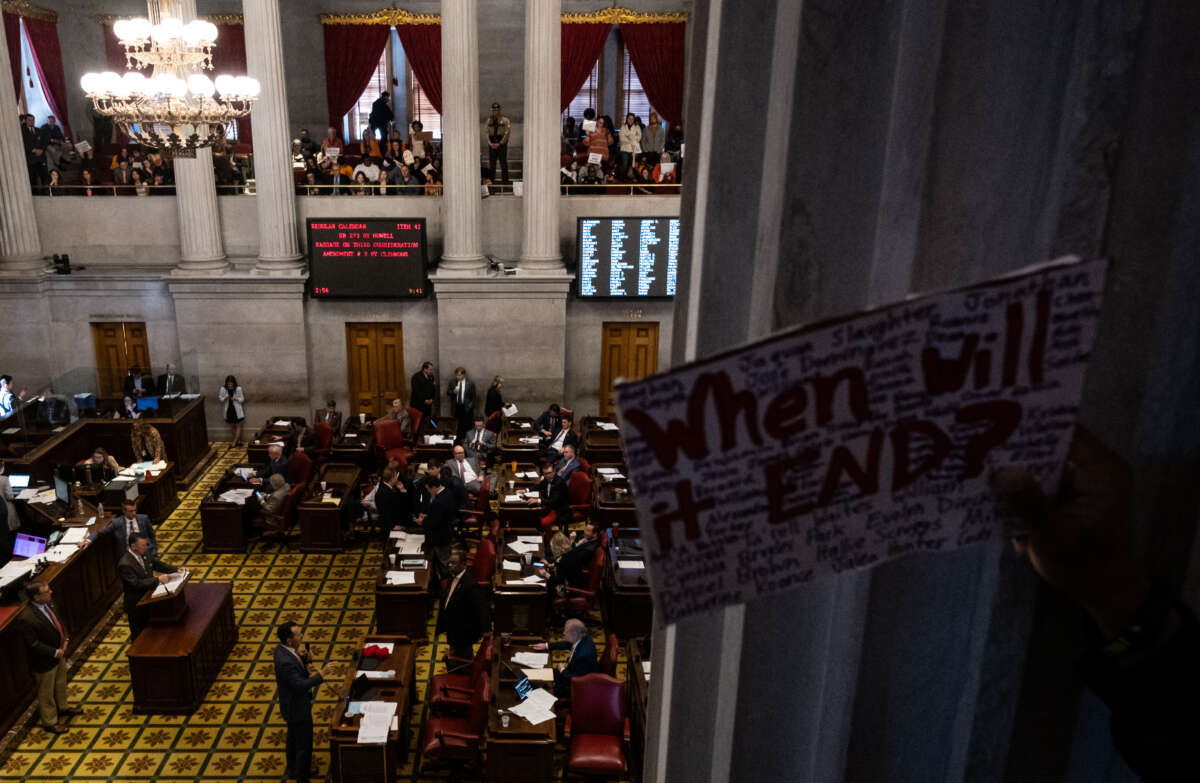Support justice-driven, accurate and transparent news — make a quick donation to Truthout today!
Shortly after Democratic state Representatives Justin Jones and Justin J. Pearson were sworn back into office on Tuesday, the Tennessee legislature passed a bill that would limit discussions on race on college campuses across the state.
House Bill 1376, also known as the Tennessee Higher Education Freedom of Expression Act, would ban the discussion of 16 “divisive concepts,” including the idea that “the United States is fundamentally or irredeemably racist or sexist.” The bill — which Pearson has said will likely curtail conversation on issues like white privilege or unconscious biases in classrooms — is currently awaiting the governor’s signature after passing in a 68 to 26 vote.
The legislation requires universities to establish a process for reporting a violation. If a report is filed, the university must investigate the report, create a corrective action plan to address the violation, and maintain a list of violators. The bill cites a professor teaching about racial or gender stereotypes as an example of a potential violation. It would also require every university to publicly release all course syllabi ahead of each semester.
“This sounds like fascism, this sounds like authoritarianism, this doesn’t sound like democracy or freedom and so again this bill is very troubling,” Jones said during debate of the bill.
An amendment to the bill, which was approved by the Senate and adopted by the House, would ban requirements for a “diversity statement” in hiring processes and bar institutions from showing “bias or favoritism for or against” student groups and guest speakers.
Under this amendment, universities would be barred from limiting the platforming of far right student groups and speakers on campus, such as Ilya Shapiro, Ben Shapiro, Richard Spencer and Gavin McInnes. The Southern Poverty Law Center has pointed out that campus appearances are “an opportunity the alt-right and other extremists are enthusiastically exploiting to attack egalitarian values and recruit students to their cause.”
Jones has voiced concern that this “unjust, immoral and extreme, racist law” will lead to further legislative attacks on intellectual freedom.
Indeed, far right legislators across the country have been proposing similar restrictions on academic and intellectual freedom, a tactic that activists have warned is frequently used by right-wing authoritarian leaders abroad, such as Hungarian Prime Minister Viktor Orbán.
One of the most notorious examples is Florida’s “Stop WOKE Act,” which forbids the state’s public school educators from teaching about racism or LGBTQ issues. Since the bill was signed into law in 2022, Florida Gov. Ron DeSantis (R) has moved to revoke funds from public colleges in the state if they offer lessons on diversity, equity and inclusion, attacked Black Studies, and appointed six far right trustees to the New College of Florida to monitor higher education. On Wednesday, Florida’s “Don’t Say Gay” law was expanded to all grade levels.
“We’re facing a regional fascist movement that is also backed by a national reactionary movement,” historian Paul Ortiz told Truthout. Florida Governor Ron “DeSantis is trying to abolish… critical race theory and gender studies because these are institutions and theories that help people challenge state power.”
Florida legislators have also introduced HB 999, which recently cleared Florida’s House Education and Employment Committee. If the bill passes the Florida legislature and is signed into law, it would “put the entire public higher education system under state control,” Eleanor J. Bader wrote in a Truthout op-ed.
Under the bill, DeSantis would be able to control the curriculum of the state’s public colleges; ban the hiring of campus diversity officers; and remove critical race theory, gender studies, and any other majors or minors that “otherwise [utilize] pedagogical methodology associated with Critical Theory.”
HB 999 would also ban colleges and universities from using funds to “promote, support, or maintain any programs or campus activities that espouse diversity, equity, or inclusion [DEI] or Critical Race Theory rhetoric.”
Conservatives in Louisiana are similarly trying to ban DEI programs. The Republican State Central Committee recently passed a resolution asking the legislature to ban DEI offices at all Louisiana universities, and the Louisiana House is currently considering a bill that would encourage all public schools in the state to submit reports on programs and activities related to DEI and critical race theory
Press freedom is under attack
As Trump cracks down on political speech, independent media is increasingly necessary.
Truthout produces reporting you won’t see in the mainstream: journalism from the frontlines of global conflict, interviews with grassroots movement leaders, high-quality legal analysis and more.
Our work is possible thanks to reader support. Help Truthout catalyze change and social justice — make a tax-deductible monthly or one-time donation today.
